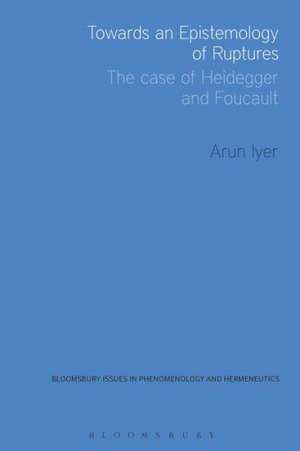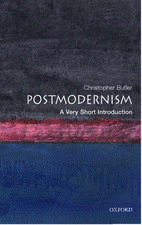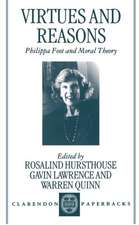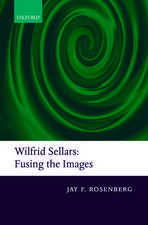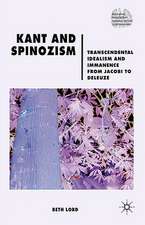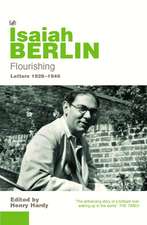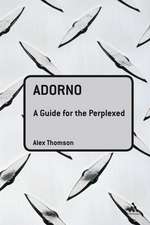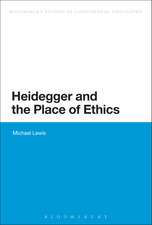Towards an Epistemology of Ruptures: The Case of Heidegger and Foucault: Issues in Phenomenology and Hermeneutics
Autor Dr Arun Iyeren Limba Engleză Hardback – 29 ian 2014
| Toate formatele și edițiile | Preț | Express |
|---|---|---|
| Paperback (1) | 256.85 lei 6-8 săpt. | |
| Bloomsbury Publishing – 29 iul 2015 | 256.85 lei 6-8 săpt. | |
| Hardback (1) | 773.81 lei 6-8 săpt. | |
| Bloomsbury Publishing – 29 ian 2014 | 773.81 lei 6-8 săpt. |
Preț: 773.81 lei
Preț vechi: 990.47 lei
-22% Nou
Puncte Express: 1161
Preț estimativ în valută:
148.06€ • 154.59$ • 122.55£
148.06€ • 154.59$ • 122.55£
Carte tipărită la comandă
Livrare economică 04-18 aprilie
Preluare comenzi: 021 569.72.76
Specificații
ISBN-13: 9781441137678
ISBN-10: 144113767X
Pagini: 232
Dimensiuni: 156 x 234 x 23 mm
Greutate: 0.52 kg
Ediția:New.
Editura: Bloomsbury Publishing
Colecția Bloomsbury Academic
Seria Issues in Phenomenology and Hermeneutics
Locul publicării:London, United Kingdom
ISBN-10: 144113767X
Pagini: 232
Dimensiuni: 156 x 234 x 23 mm
Greutate: 0.52 kg
Ediția:New.
Editura: Bloomsbury Publishing
Colecția Bloomsbury Academic
Seria Issues in Phenomenology and Hermeneutics
Locul publicării:London, United Kingdom
Caracteristici
Provides new insights into key epistemological issues concerning concepts of knowledge and thought
Notă biografică
Arun Iyer teaches Philosophy at Seattle University, USA.
Cuprins
AcknowledgementsAbbreviations of Frequently Cited TextsIntroduction1. Heidegger's Reformulation of the Essence of Thought (I): From the Transcendental Power of the Imagination to the Ontological Power of Thought2. Heidegger's Reformulation of the Essence of Thought (II): On the Relationship between Thought and Being3. Heidegger's Reformulation of the Essence of Knowledge: From Husserl's Transcendental Idealism to Heidegger's Historical Ontology4. Foucault's Reformulation of the Essence of Thought in The Order of Things 5. Foucault's Reformulation of the Essence of Knowledge: From Husserlian Phenomenology to Foucauldian Archaeology ConclusionBibliographyIndex
Recenzii
I praise Iyer first and foremost for his clarity of style, which does not come at the expense of intellectual interest or depth. In this book Iyer moves effortlessly between Kant, Heidegger, Husserl, and Foucault in a way that is elucidating and purposeful.
Epistemology as traditionally conceived seeks to determine the nature of knowledge and justification. Its point of departure is Plato's critique of the relativism of Protagoras, who according to Plato erred by accepting Heraclitus' construal of being as becoming. Truth, knowledge, and justification must be grounded in timeless entities of some sort. Arun Iyer shows how Heidegger and Foucault reverse this Platonic argument. For them, truth, knowledge, and justification are irreducibly historical. Iyer's elaboration of their views is subtle, original, and thought-provoking.
Epistemology as traditionally conceived seeks to determine the nature of knowledge and justification. Its point of departure is Plato's critique of the relativism of Protagoras, who according to Plato erred by accepting Heraclitus' construal of being as becoming. Truth, knowledge, and justification must be grounded in timeless entities of some sort. Arun Iyer shows how Heidegger and Foucault reverse this Platonic argument. For them, truth, knowledge, and justification are irreducibly historical. Iyer's elaboration of their views is subtle, original, and thought-provoking.
